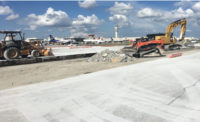For China watchers, it comes as no surprise that China is rapidly undergoing an industrial revolution. What Europe and the U.S. did in 75 to 100 years, China has done in about 25 years. Despite the global economic downturn, the economy is still booming. However, with the slowing of exports, the Chinese economy now is being driven mainly by domestic and foreign direct investment.

HOENIG
Companies wanting to participate in the massive growth soon realize China is a complex and often contradictory business environment for both foreign and domestic players. When they arrive and set up operations, foreign companies, in particular, find the environment very daunting. The various contradictions in China—old vs. new, open vs. protected, Party direction vs. market economy, rapid economic change vs. slow bureaucracy, cultural norms vs. social change—all create an opaque and perplexing business environment full of unseen risks.
Fraud and unethical business behavior is one of the greatest risks of doing business in China. Fraud never respects national or cultural boundaries and can surface at any level in any country, company or industry. With the massive amount of public and private infrastructure investment in China fueling the growth over the last 15 years, fraud is all too common in real-estate and construction-related industries. Over 63% of the 70,000 corruption cases investigated since the mid-1990s in China involved construction projects.
Fraud occurs when motivation and rationalization meet opportunity, and the construction sector offers many opportunities. The sector is particularly susceptible as projects often involve multiple parties or partners joined together for a short project period. These partners, such as foreign and domestic owners, local government entities, engineers, vendors, suppliers, contractors, etc., often are unaware of one another’s professional and personal relationships within the local industry and local community. Furthermore, project-management teams frequently are hastily assembled from other locations around the globe, creating the opportunity for cultural misunderstandings, jobsite nepotism and a lack of understanding of local business practices.
A lack of oversight by headquarters and nonexistent, unfamiliar or poorly implemented internal control measures compound these problems. The result is a standalone project operation with an opaque operating environment and large, accelerated cash flows—the “perfect storm” for fraud to occur.
New Concept
Professional program management or project management oversight is a relatively new concept in China and not well understood. It only became important around 2005, when project, cost, schedule and quality controls were needed for the massive Olympics programs. In short, traditionally there has been a lack of independent oversight on projects, resulting in multiple opportunities for fraud and unethical behavior.
In a recent survey, 84% of companies reported at least one asset-protection fraud in the past three years. In China, 96% of companies reported such fraud. Of these cases, 41% of China’s bribery cases were in construction, with 91% of companies suffering losses from corruption or fraud in the last three years. In fact, construction in China is always ranked first in size and frequency of fraud, ahead of defense, oil and gas and banking and finance.
In construction in China, 70% of projects are not completed on time, 73% are over budget and up to 20% of capital cost is wasted due to fraud, theft and negligence. One senior Chinese official even stated that 40% of China’s construction projects are “out of control” with regard to health, safety and corruption.
Construction-project risks involving fraud are both classical and country-specific in nature. Corruption and bribery can occur at any phase of a project, from designer bid-rigging to inflated construction change-order approval and resulting kickbacks. Bribery may be defined as the offering, giving, receiving or soliciting of anything of value to influence a decision without the employer’s knowledge and consent. Traditionally, the term “bribery” in China refers to illicit offers to government officials.
If a bribe influences a private business decision, it is more specifically defined as “commercial bribery.” The bidding and procurement stage is particularly susceptible to this type of fraud, as unethical employees may have conflicts of interest or arrange kickbacks with certain suppliers.
But the problem goes much deeper and broader on many projects. Common are bid-rigging, kickbacks for single-source specifications, inflated change orders, acceptance by the field staff of inferior substitutes for products and materials, lavish entertainment and junkets and even gratuities for putting through telephone calls. For some members of the project team in the field, it is fair game to get a piece of the pie. Contractors and vendors are all too willing to accommodate these kickback requests or, conversely, tempt project team members with opportunities to earn some money on the side. Additional project risks include theft of intellectual property, materials, tools, equipment and other physical assets.
Chinese anti-bribery laws outline the penalties for fraud and corruption in China, as do the U.S. Foreign Corrupt Practices Act and the international Organisation for Economic Co-operation and Development. Under Chinese law, individuals or entities convicted of commercial bribery may face fines, confiscation of illegal income, circulation of a “notice of criticism,” suspension of business practices or revocation of business licenses.
An individual in China who bribes another individual is only criminally liable for corruption if the bribe offered exceeds 10,000 RMB, which is easily within the scope of construction projects. For an individual bribing an entity, the minimum bribe for criminal liability is 100,000 RMB. For entities, regardless of whether the recipient is an individual or another company, the criminal-liability minimum is 200,000 RMB.
Bribes under Chinese law refer only to property and other quantifiable material benefits. Chinese law fails to include the many intangible benefits that can be offered to gain preferential treatment in a business situation, such as bid-rigging.
Businesses should recognize the business case for fraud prevention. Fraud prevention saves money, protects one’s reputation and sets the right ethical tone on projects. Development of a capital-project risk-management strategy (CPRM) by the owner not only would reduce the risk of project fraud, corruption and theft but also save a company the monetary and reputational damages these risks pose.
Like construction safety and quality, fraud prevention cannot be the responsibility of a few. Ethical behavior in the construction industry must be ingrained throughout the company culture and on the project team. It must be driven from the top but implemented from the bottom up. Setting clear expectations early in the project-planning phase is mandatory. Unfortunately, few companies address and incorporate this integrity-awareness training concept on new projects.
Like safety and quality, ethical conduct also should be rigidly enforced with a zero-tolerance policy for violations. All members of the project team should undergo integrity training throughout the project—in a sense, they should expose fraud and act as a deterrent.



Post a comment to this article
Report Abusive Comment